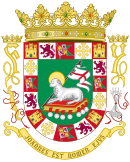Our website is made possible by displaying online advertisements to our visitors.
Please consider supporting us by disabling your ad blocker.
Politics of Puerto Rico
 |
|---|
The politics of Puerto Rico take place in the framework of a democratic republic form of government that is under the jurisdiction and sovereignty of the United States Congress[1] as an organized unincorporated territory. Since the 1898 invasion of Puerto Rico by the United States during the Spanish–American War, politics in Puerto Rico have been significantly shaped by its status as territory of the United States. The nature of Puerto Rico's political relationship with the United States is the subject of ongoing debate in Puerto Rico, in the United States, the United Nations and the international community, with all major political parties in the archipelago calling it a colonial relationship.[2][3][4][5][6][7][8]
As a republican form of government, the government of the Commonwealth of Puerto Rico is divided into three branches: executive, legislative and judicial, as established by the Constitution of Puerto Rico. The executive power is exercised by the executive branch, which is headed by the governor, advised by a cabinet of secretaries that are independent of the legislature. Legislative power is vested upon the Legislature. Judicial power is exercised by the judiciary, consisting of the Tribunal Supremo de Puerto Rico, the Tribunal de Apelaciones (English: Court of Appeals), and Tribunal de Primera Instancia (English: Courts of First Instance). There is also a Federal Court to hear cases of a federal nature or with federal jurisdiction.
Puerto Rico's governor, who is the head of government, and the members of the legislature are elected every four years by popular vote. Puerto Rico's legislature is a bicameral body consisting of a Senate and a House. The members of the judicial branch are appointed by the Governor with the approval of the Senate to serve until they reach age 70. Due to the status of Puerto Rico as a territory of the United States, its residents cannot vote in the U.S. presidential elections.
Politics in Puerto Rico revolve around a multi-party political system. The politics of Puerto Rico are dominated by three political parties: the Partido Nuevo Progresista (PNP), the Partido Popular Democratico (PPD), and, to a lesser extent, the Partido Independentista Puertorriqueño (PIP).
- ^ "Commonwealth of Puerto Rico vs Sanchez Valle, No. 15–108. (Argued January 13, 2016—Decided June 9, 2016) Supreme Court of the United States" (PDF). Supreme Court of the United States Blog. June 9, 2016. Archived from the original (PDF) on July 23, 2019. Retrieved August 30, 2021.
- ^ "puertorico-herald.org". www.puertorico-herald.org.
- ^ "Political Status of Puerto Rico: Options for Congress. Summary page" (PDF).
- ^ "Constitutional Rights Foundation". Archived from the original on June 10, 2009. Retrieved January 24, 2020.
- ^ Puerto Rico: The Trials of the Oldest Colony in the World. Jose Trias Monge. Yale University Press. 1997.
- ^ Archaeology and the Postcolonial Critique. Matthew Liebmann and Uzma Z. Rizvi. Page 54. Accessed January 24, 2020
- ^ Puerto Rico in the American Century: A History Since 1898. César J. Ayala and Rafael Bernabe. Page 82. Accessed January 24, 2020.
- ^ Alfredo Lopez (1987). Dona Licha's Island: Modern Colonialism in Puerto Rico. South End Press. p. 127. ISBN 978-0-89608-257-1.
Previous Page Next Page


